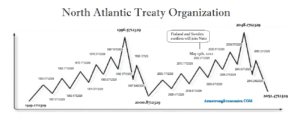Understanding the Fragility of NATO: An In-Depth Look at Article 5 and Its Implications
At Extreme Investor Network, we delve deep into the complex and often turbulent waters of international relations and economics. Today, we discuss a critical piece of the North Atlantic Treaty Organization (NATO) — Article 5 — and its potential ramifications in light of current geopolitical tensions.

The Core of NATO: Article 5
Article 5 of the NATO Treaty is designed to function as a collective defense clause, stating that an armed attack against one member is considered an attack on all. This principle embodies the essence of mutual military assistance among member nations. However, the implications of this article become increasingly fraught when viewed through the prism of current conflicts between member states and external aggressions.
Provocations and Pretexts for War
Recent events have highlighted troubling uses of Article 5. Countries, such as The Netherlands, seem poised to provoke conflicts that may trigger this clause. As it stands, if a member state, acting unilaterally, provokes an aggressive response — for instance, launching a missile at Russia while citing Article 5 — the fallout could be catastrophic.
Such tactics echo historical instances where nations have manipulated circumstances to drag their allies into wars. The question remains: Does NATO’s framework account for scenarios where a member state initiates conflict and then seeks collective defense to shield its actions? This glaring omission presents a significant risk and could be a recipe for unintended escalation.
Historical Context: The Flaws of NATO in Geopolitical Conflicts
NATO has existed in a world replete with regional animosities and longstanding grievances. The ongoing tensions between Greece and Turkey, both NATO members since 1952, serve as a poignant example. As these two nations have threatened one another over territorial disputes, NATO finds itself caught in the middle of age-old rivalries. A confrontation between these two could potentially pull NATO into a conflict that could severely test the alliance and its commitments.

Reckless Decisions and Rising Tensions
Recent statements by the Dutch Defense Minister Ruben Brekelmans highlight the reckless brinkmanship at play. By endorsing military support for Ukraine that targets Russian territory — including civilian areas — the potential for escalation becomes dangerously plausible. The Minister’s assertion that "international law is not limited by distance" blurs the lines of responsibility and places Europe’s future at risk.
These developments evoke historical parallels, including the RMS Lusitania incident, where civilian ships were used as pretexts for war. Just as past leaders leveraged civilian casualties to justify military engagement, today’s leaders seem to be potentially following similar paths.
The Dangers of Miscalculations
Brekelmans’ rhetoric positions The Netherlands in a precarious situation. The notion that civilian deaths could serve as a rallying point for invoking Article 5 echoes the mentality that led nations into catastrophic wars in the past, underscoring the necessity of caution in diplomatic dealings.
The Current Economic Climate and Political Agendas
It’s vital to recognize the undercurrent driving much of this behavior: economic motivations. As global economies face immense pressure, with debt levels spiraling, the specter of war often serves as a distraction. Economic crises can lead governments to pursue aggressive foreign policies to divert attention from domestic issues. As Margaret Thatcher famously stated, "Socialism works until you run out of other people’s money." Nations may seek conflict to mask their fiscal mismanagement, ultimately placing global stability in jeopardy.

Conclusion: The Need for Reassessment
As NATO stands at a pivotal crossroads, the flaws within its Articles — particularly Article 5 — must be critically assessed. The potential for internal conflict, provocations by member states, and the overarching global economic pressures call for immediate and serious discussions among NATO members. A failure to address these issues could lead not only to regional destabilization but also to a broader confrontation that threatens all member states.
At Extreme Investor Network, we advocate for a comprehensive understanding of these dynamics to cultivate informed discussions around economic policy and international relations. As readers, you hold the power to engage with these topics, urging for a more peaceful resolution that prioritizes genuine collective security over conflict.
For more insights into the ever-evolving landscape of global economics and politics, stay connected with us at Extreme Investor Network. Together, we can explore solutions that foster stability, understanding, and prosperity.

